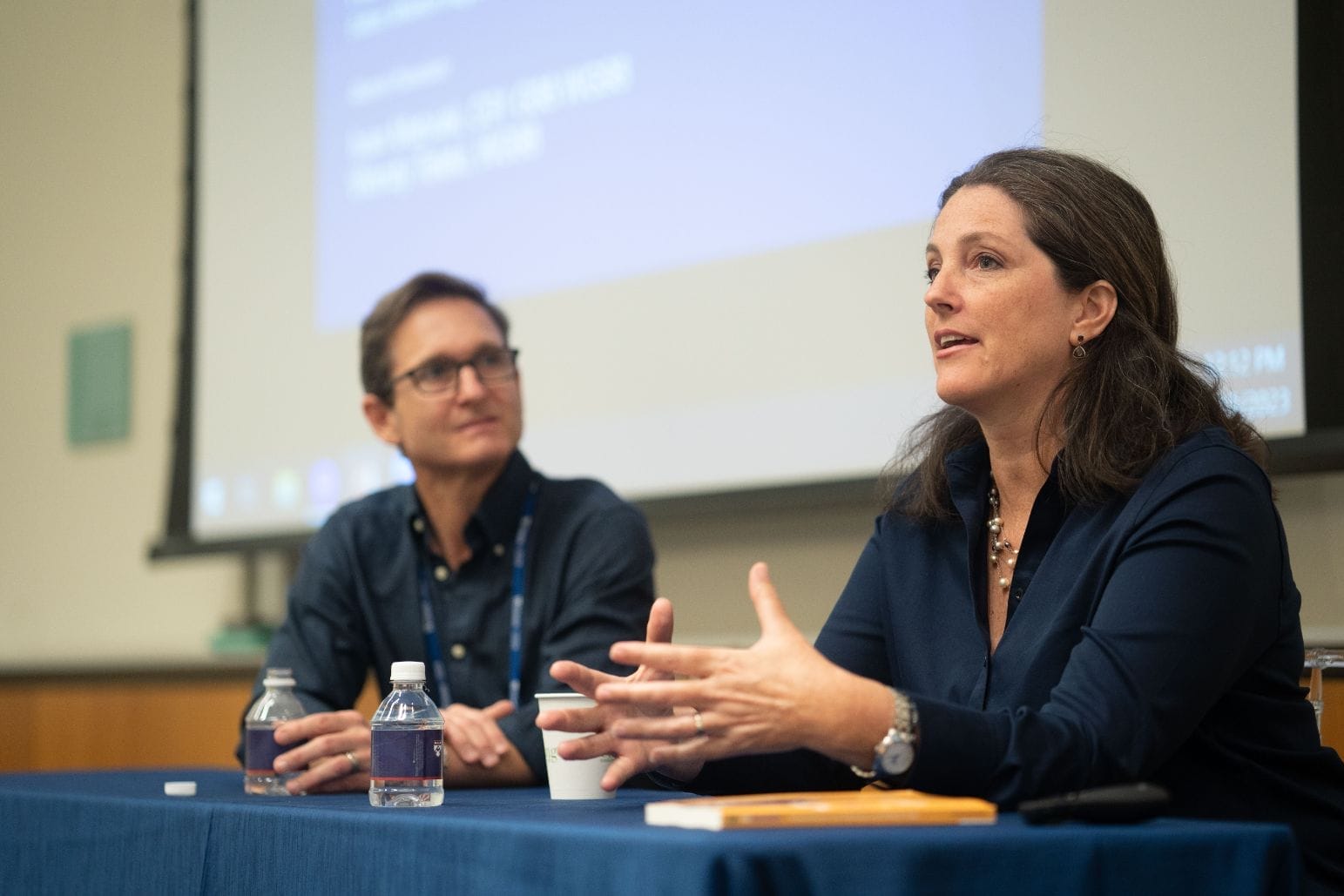For spouses Ivan Matviak C91 G98 WG98 and Heidi Gardner C92, co-authoring a book was a bit like going to the gym. “Doing it with someone else, it’s easier to go in the morning and start getting motivated,” said Matviak, who toiled with Gardner on Smarter Collaboration: A New Approach to Breaking Down Barriers and Transforming Work during early-morning hours each week. Their book offers big ideas for coming together more effectively with colleagues, clients, and other professional partners.
Wendy Teleki WG98 similarly set aside regular time to brainstorm with Lisa Neuberger C95 WG00 and Monica Brand for Rebalance: How Women Lead, Parent, Partner, and Thrive. “We would get together on Saturday mornings,” said Teleki. “It was during the pandemic, so the kids were asleep until like one in the afternoon; we had all morning to do what we wanted.”
Matviak and Teleki shared the importance of scheduling working sessions and other insights for joint book projects with an audience of fellow alumni during Wharton Magazine’s Alumni Authors Salon at this year’s Wharton MBA Reunion Weekend in Philadelphia.
Among the other advice they imparted, the authors stressed the benefits of careful planning. “We spent a lot of time thinking about the structure,” said Teleki, who deliberated with her co-authors to organize their book about balancing the many aspects of our lives into four sections — namely, the professional, family, personal, and community parts of ourselves. “Within that, we had to figure out what our key takeaways were. What were the things that we really wanted to talk about and the things that we felt really passionately about?”
When it came to short-term planning, Matviak and Gardner found it helpful to dedicate the end of each working session to pinpointing action items for the next one. “We were doing it in two-hour chunks, so sometimes we’d finish and then the next morning ask, ‘Where did we leave off?’” said Matviak, who added that he and Gardner typically identified three things to kick off with the next day.
To keep the ideas flowing, both teams took much-needed breaks from their computers, a strategy the panelists suggested to aspiring writers in the audience. For Teleki and her co-authors, that sometimes meant going on what they called “walk and talks” in early stages of the process. Matviak and Gardner also relied on fresh air to facilitate new thoughts. “When we were just sitting there, we would get up away from the laptop and go for a walk around the block a couple of times,” said Matviak.

Ivan Matviak C91 G98 WG98 and Wendy Teleki WG98
As for keeping track of their ideas, various technologies proved vital for the authors at certain points. “Most of the time, we were either doing voice memos or taking notes,” said Matviak about his and Gardner’s walks. The Rebalance team tracked their own thoughts, podcasts, articles, and more in messenger apps like Slack and WhatsApp. “Every once in a while, we’d be like ‘Oh what were we talking about?’” said Teleki. “That’s when we would go back to the WhatsApp chain.” For some of their writing and editing, Teleki and her co-authors also turned to Google Docs to collaborate.
Among the challenges that came up, Matviak and Gardner tried different ways of writing to find their groove. “We initially started writing it together,” said Matviak. “And then we debated whether that was the most efficient way of doing it. So, we took a different approach, which was divide and conquer.” That method, he said, didn’t work for the couple: “We found that when we wrote in real-time together, the ideas would spark off each other.”
On the other hand, as writers living in separate households, Teleki and her co-authors used individual ideation as an efficient way to get first drafts on the page. With their book split into quarters each containing three chapters, the authors initially took one chapter apiece from each quarter. “The writing was pretty quick because, the next week, we would [all] come back with a chapter,” said Teleki. The difficult aspect of that approach, she added, was editing the drafts so that the book had a single voice and overall coherence. But perhaps more challenging than anything, she joked, “Sometimes, we felt like getting the title right was the hardest problem.”


























